El estudio de palabras clave es el proceso de búsqueda y análisis de palabras clave relevantes para tu negocio online. El análisis de palabras clave es lo que debes hacer primero, antes de cualquier otra acción de SEO.

An effective keyword research strategy can bring great benefits:
In this article, we want to help you determine which strategic keywords to include in your website content. Keyword research and analysis is about understanding your target audience and discovering how they are searching for your content, services or products.
Keyword research will provide you with specific search data that will help you answer questions such as:

Before the keyword study, ASK YOURSELF QUESTIONS
As SEO experts, before we can help our clients grow through proven SEO strategies, we must first understand what kind of company they are and, more importantly, who their target audience is and, more importantly, the objectives of this target.
Keyword research takes time. At first, you might think that you already know what terms you want to rank for. But between what you think or want, and what your audience wants, there can be big differences.
Focusing on your audience and then using keyword data to sharpen the insights you’ve gained will help you run more successful SEO campaigns.
To improve and get the right strategic keywords for your website, you first need to understand a bit more about your potential customers online. To do this, you can ask yourself questions such as:

Answering these questions is a crucial planning step that will guide your keyword research and help you create better content.
You may have a way of describing what you do, but how does your audience search for the products, services or information you provide? Answering this question is a crucial first step in the keyword analysis process.
The tools allow you to analyse and determine how to proceed in a correct keyword analysis. You should not decide whether you want to cover a specific keyword on your website by intuition alone. It is important to be intuitive, but you cannot base your entire strategy on intuition.
You probably have several keywords in mind that you would like to rank for. These will be your products, services or other topics that your website addresses, and are excellent initial keywords for your research.
Enter these keywords into a Keyword Planner Tool to discover the average monthly search volume and similar keywords. It is always a good idea to corroborate data using different professional tools.
Once you enter your initial keywords into a keyword research tool, you will begin to discover other keywords, common questions and topics for your content that might otherwise go unnoticed.
During the discovery phase, it can help you determine which variations of your keywords are most popular with search engines.
We are going to introduce you to three tools you can use to search for new keywords:
Google Ads Keyword Planner: It’s Google’s official tool for keyword analysis and provides the most accurate data regarding monthly searches. However, you should not always select 100% of the keywords provided by the planner.
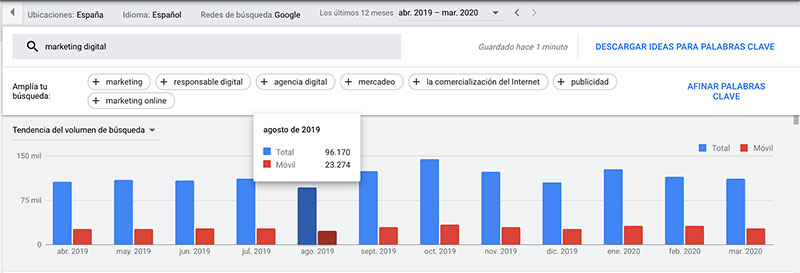
In addition to the search volume, you should be taking into consideration the suggested bid and the competition of the keywords.
SEMrush: is an SEO tool that can be used for much more than just keyword research. As its name suggests, SEMrush initially specialised in SEM. But it has adapted to the times and is also a very powerful SEO tool.
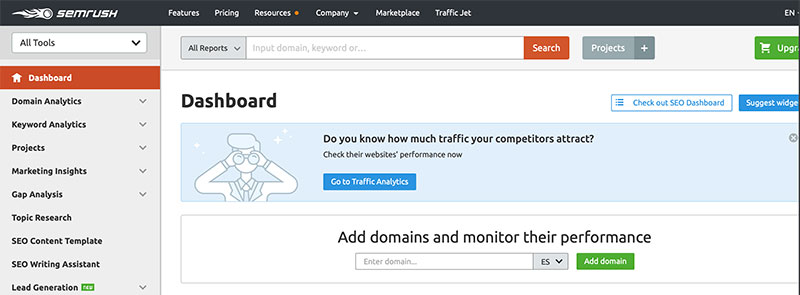
SEMrush tracks the keyword strategy used by competitors, doing SEO audits of your blog, looking for backlinking opportunities and much more. Today, this tool is trusted by marketers around the world and is used by a large number of companies, large and small.
While the Google Keyword Planner is free, SEMrush is paid. It is more comprehensive, in the sense that it offers more analysis options, such as:
It is advisable to review both, Google Keywords planner and SEMrush before taking action.
Ahrefs: was initially known as a link analysis tool. But due to the impressive growth of its database, Ahrefs has managed to match or even surpass the accuracy of SEMrush.
As with SEMrush, Ahrefs allows you to see what keywords your competitors are ranking for or where they rank for the keyword you are analysing.
In addition, it also offers you the “Keyword Explorer” option to get many keywords from a given keyword.
Keyword search volume refers to the volume (or number) of searches for a particular keyword in a given time period. Keyword search volume is generally averaged to provide an idea of the competitiveness of a search term.
This data allows SEO experts and marketers to see how certain keywords generate traffic over time.
Seasonality often plays an important role in keyword search volume. Websites that are search engines and deal comparators may start their “Christmas gift ideas” style keyword searches in July, but most people will wait until October or November before performing this type of search.
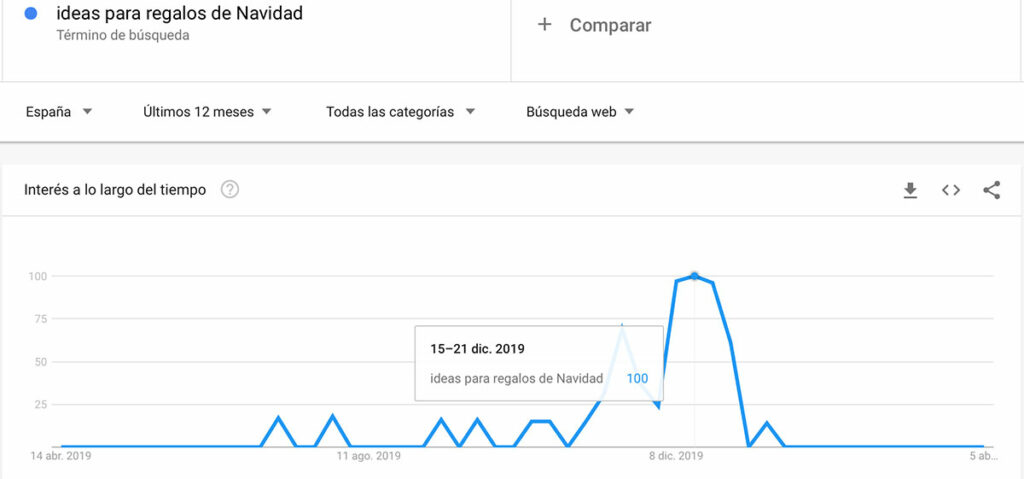
It is important to look at the number of searches when analysing a specific keyword. The more searches a keyword has, the more traffic we get and the more audience we can reach. But how do we know which volume range to target? Because the more volume, the more competition, and the more difficult it will be to get a good position.
The tools mentioned above will be essential. They will allow you to find out which keywords are really relevant to your website, taking into account the above points.
In the process of discovering relevant keywords for your content, you will probably notice that the search volume for those keywords varies greatly. While it is definitely in your best interest to try to cover the search terms that your audience is searching for, in some cases, it may be more advantageous to try to target terms with a lower search volume because they are much less competitive.
Since both high and low competition keywords can be advantageous to your website, learning more about search volume can help you prioritise keywords and choose the ones that will give your website the greatest strategic advantage.
There are two crucial factors to take into account: volume and competitiveness.
Keywords with higher volumes mean more potential exposure or percentage of impressions, but are likely to be more competitive. This, in turn, makes it harder to rank for these terms, as you are likely to be up against well-established advertisers and sites, or higher CPCs if you are doing SEM on these words as part of a paid search campaign.
As you research search volume for certain keywords, general intent and popularity, you will be answering the questions your audience wants answers to.
Knowing the user’s search intent is crucial to ranking well in search engines. It is more important that your website addresses the problem a user is trying to solve, than that your website contains the keywords that the user uses.
SEO experts know that keywords and long tail keywords reflect much more than just user search queries. Possible user intentions should be taken into account when including keywords in your website content.
Here are some examples of query types based on user intent:
When conducting keyword research, SEO experts must group the various possible intentions within search queries. Search engines identify and rank the most relevant websites for the user and want to satisfy the user’s needs in the same process. Therefore, it is essential that these factors are included.
To get a rough idea of the search intentions that search engines interpret on a particular search query, you can perform a search on a specific keyword and look at the top positions.
Search engines are very good at deciphering the intentions of search queries in order to generate better search results.
Now that you know the most relevant factors to take into account for keyword analysis and research, and the different tools you can use, you can start your keyword research.
Think about the topics you want to rank for. You’ll come up with several groups of topics that you consider are important to your business.
Put yourself in the shoes of your buyer personas: what types of topics would your target audience search that you would want your business to get found for?
Once you have your groups of relevant topics, it’s a good time to analyse the search volume for each. This data will allow you to find out how important these topics are to your audience, and how many different sub-groups you might need to create content on.
Identify the keyword and keyword phrases you think are important to rank for in the search engine results pages because your target customer is probably conducting searches for those specific terms.
At this step, you don’t need to come up with your final list of keyword phrases. What you need is to brainstorm all keywords and phrases that you think potential customers might use to search for content related to that particular topic bucket.
Once you have your final list, its a good time again to use the SEO tools previously mentioned.
The amount of Keywords that are getting encrypted by Google is currently increasing, hence to come up with keyword ideas you can also determine which keywords your website is actually getting found for. You will need Google Analytics in order to step deep into your website’s traffic sources, have a deep look through your organic search traffic bucket to identify the keywords people are using to arrive at your site.
Use Google to see related search terms that appear when you enter a keyword.
When you type in a specific phrase and scroll down to the bottom of Google’s results, you will find some suggestions for searches related to your original search. These keywords can give you some ideas for other keywords you may want to take in consideration.
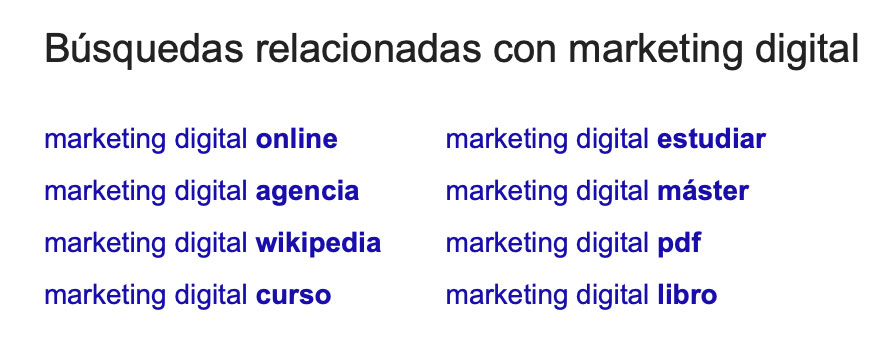
You can also use Google’s search bar autocomplete to get new keyword ideas:
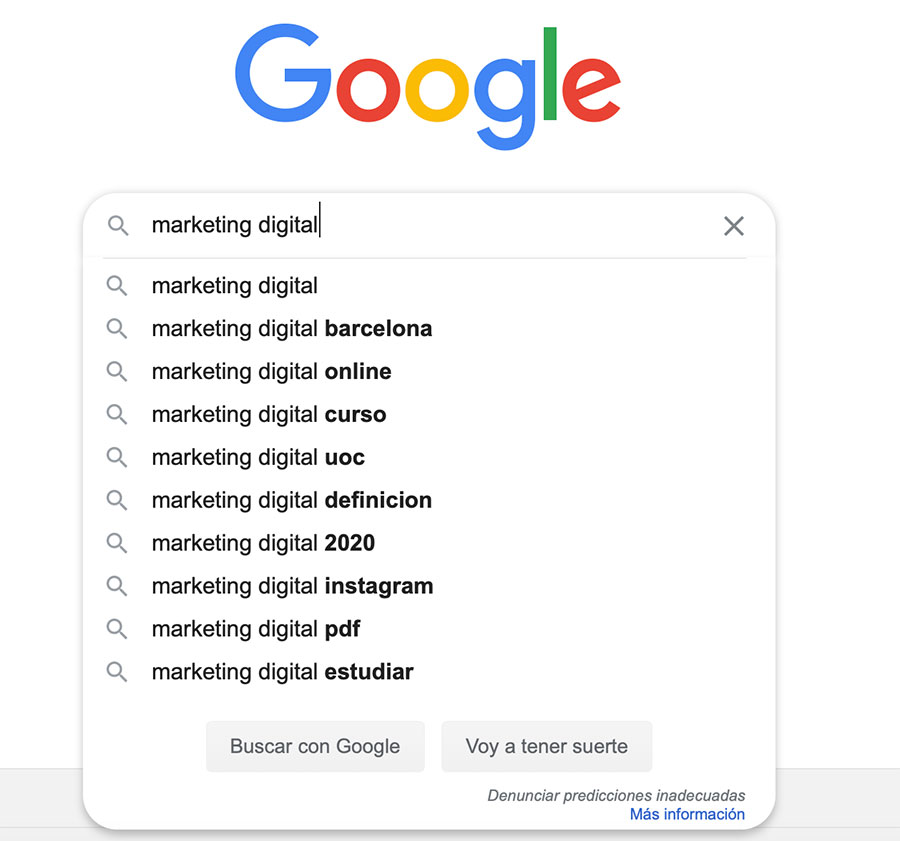
It’s important to have a list of head terms and long-tail terms and mix them in order to follow a keyword strategy with long-term goals and short-term wins. Head terms are generally searched more frequently, making them often much more competitive and harder to rank for than long-tail terms.
Knowing what keywords your competitors are trying to rank for is a great way to help you give your keyword list another dimension.
If your competitors are ranking for certain keywords that are in your list, it is a good idea to work on content based on those keywords to improve your ranking for those keywords. It is important that you don’t ignore keywords that your competitors don’t seem to be ranking well for, as this could be a great opportunity to stand out on important terms with very low competition.
SEMrush allows you to get a series of free reports that show you the top keywords for a specific domain. This is a quick way to get an idea of the types of terms your competitors are ranking for.
In addition, you can search for keywords manually in an incognito browser and see what positions your competitors are getting.
Finally, be sure to re-evaluate your keywords every few months. Some companies even evaluate their keywords on a weekly basis. It depends on many factors such as competition and the particular sector you want to rank for.
As you gain more authority in the SERPs results, you will find that you can add more keywords to your lists as you work to maintain your current presence and grow into new areas.
Once you have made your keyword list (which you will have to update often), the most important part of all remains: the creation of unique and quality content.
You should create original content from the list of keywords you have found. This way, you will be giving them the specific information that your target audience is looking for and your bounce rate will go down. This will make your search engine rankings go up.
Do you want Kiwop to help you carry out a professional keyword research?
If you want to have the website you want or increase the online visibility of your brand, we know how to do it.
Shall we start today?
Leave a Reply